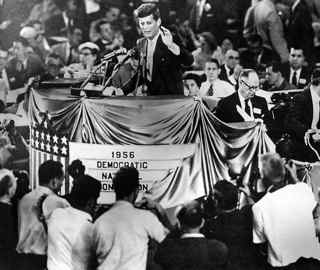1956 Democratic Convention

1956 Democratic Convention
Kennedy was an early supporter of the nomination of Adlai Stevenson to be the Democratic Presidential candidate in 1956. He attempted to secure the nomination as Vice Presidential candidate for himself . When the convention was thrown open for a floor vote by Stevenson, Kennedy nearly prevailed, in close fought race against Senator Estes Kefauver of Tennessee. His actions at the convention proved that he was a national figure.
Senator Kennedy was interested in becoming the Democratic Vice-Presidential nominee in 1956. His plan was to become Vice President in 1956 and, eight years later, run for President, at the still-young age of 47. For the scenario to be realistic, he hoped that President Eisenhower, who was in questionable health, would not run for re-election. He also believed that the Democrats needed a stronger candidate than Adlai Stevenson, who had lost the Presidential election in 1952. Joe Kennedy secretly offered Lyndon Johnson financial support if he would run and make Jack his running mate. Johnson refused, as he was not willing to commit to a race, when he thought Eisenhower might still choose to run.
When it became clear that Stevenson would be the nominee, against the incumbent Eisenhower. Jack decided to pursue the nomination for Vice President, despite his father's counsel that Stevenson would not win and that it would be counterproductive to run and lose. Kennedy hoped to gain Stevenson's support. Stevenson, however, ducked the question. He neither wanted Kennedy as a running mate nor did he want to alienate the Kennedy family. Instead, Stevenson broke with tradition and opened the Vice-Presidential vote to be decided by the convention To compensate Kennedy, for not selecting him and forcing him to run at the convention, Stevenson asked Kennedy to be the one to nominate him, a clear honor for Kennedy, a first term Senator.
In the vote for the Vice-Presidential nomination, Kennedy became involved in an active floor fight with Senator Estes Kefauver of Tennessee. Kefauver started out as the favorite, having run for the Presidential nomination with many delegates already pledged to him. In the first ballot, Kefauver received 483 1„2 votes, as opposed to 304 for Kennedy. On the second round, Kennedy surged ahead with 648 votes to Kefauver's 511, but on the third round, Kefauver secured the nomination.
While Kennedy failed to achieve the nomination as Vice President, his nearly- successful attempt ultimately allowed him to achieve the best of both worlds. He received significant national attention by running and almost achieving the nomination. But, he was not saddled with being part of what would be a failed campaign. He went on to work actively in support of the Democratic ticket and simultaneously developed a strong cadre of Kennedy supporters nationwide.
 >
>